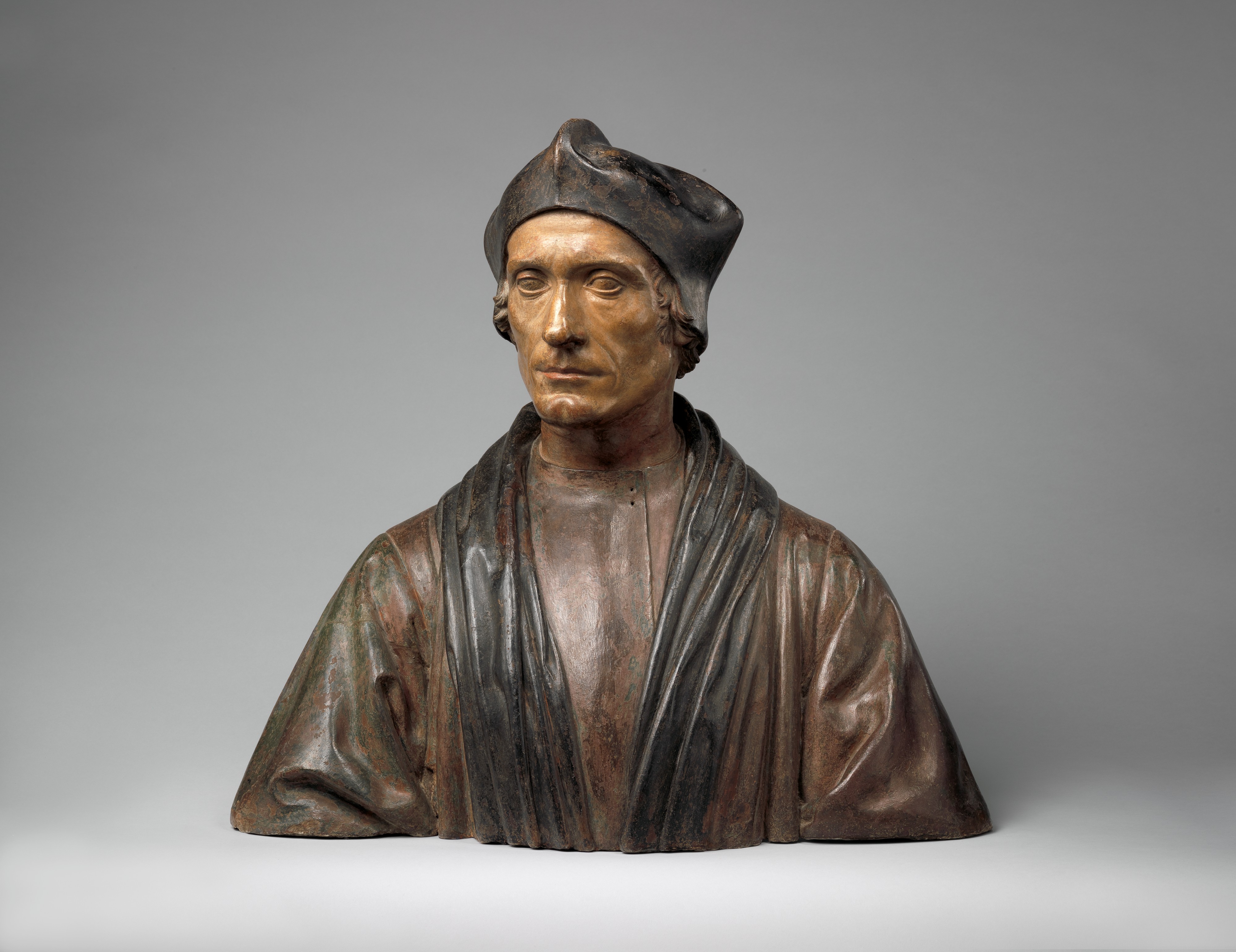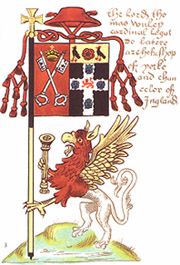|
Thomas Audley, 1st Baron Audley
Thomas Audley, 1st Baron Audley of Walden KG, PC, KS, JP (30 April 1544), was an English barrister and judge who served as Lord Chancellor of England from 1533 to 1544. Early life Audley was born in Earls Colne, Essex, the son of Geoffrey Audley, and is believed to have studied at Buckingham College, Cambridge, now known as Magdalene College. He was educated for the law, entered the Inner Temple, was named town clerk of Colchester in 1514, and became Justice of the Peace for Essex in November 1520. Career in Parliament In 1523 Audley was returned to Parliament for Essex, and represented this constituency in subsequent Parliaments. In 1527 he was Groom of the Chamber, and became a member of Wolsey's household. On the fall of the latter in 1529, he was made Chancellor of the Duchy of Lancaster, and the same year Speaker of the House of Commons, presiding over the famous assembly styled the Reformation Parliament, which abolished the papal jurisdiction. The same year he h ... [...More Info...] [...Related Items...] OR: [Wikipedia] [Google] [Baidu] |
The Right Honourable
''The Right Honourable'' (abbreviation: The Rt Hon. or variations) is an honorific Style (form of address), style traditionally applied to certain persons and collective bodies in the United Kingdom, the former British Empire, and the Commonwealth of Nations. The term is predominantly used today as a style associated with the holding of certain senior public offices in the United Kingdom, Canada, New Zealand, and, to a lesser extent, Australia. ''Right'' in this context is an adverb meaning 'very' or 'fully'. Grammatically, ''The Right Honourable'' is an adjectival phrase which gives information about a person. As such, it is not considered correct to apply it in direct address, nor to use it on its own as a title in place of a name; but rather it is used in the Grammatical person, third person along with a name or noun to be modified. ''Right'' may be abbreviated to ''Rt'', and ''Honourable'' to ''Hon.'', or both. ''The'' is sometimes dropped in written abbreviated form, but is ... [...More Info...] [...Related Items...] OR: [Wikipedia] [Google] [Baidu] |
John Fisher
John Fisher (c. 19 October 1469 – 22 June 1535) was an English Catholic prelate who served as Bishop of Rochester from 1504 to 1535 and as chancellor of the University of Cambridge. He is honoured as a martyr and saint by the Catholic Church. Fisher was executed by order of Henry VIII during the English Reformation for refusing to accept him as Supreme Head of the Church of England and for upholding the Catholic Church's doctrine of papal supremacy. He was named a cardinal shortly before his death. In answer to a popular petition of English Catholics, Pope Pius XI canonized John Fisher and Thomas More on 19 May 1935 as representatives of the many Catholic martyrs of England. The two martyrs share a common feast day on 22 June in the current General Roman Calendar of the Catholic Church. His name also appears in some Anglican calendars of saints. Biography Early life John Fisher was born at Beverley, Yorkshire in 1469, the son of Robert Fisher, a prosperous mercer of ... [...More Info...] [...Related Items...] OR: [Wikipedia] [Google] [Baidu] |
English Reformation Parliament
The English Reformation Parliament, which sat from 3 November 1529 to 14 April 1536, established the legal basis for the English Reformation, passing major pieces of legislation leading to the break with Rome and increasing the authority of the Church of England. Under the direction of Henry VIII of England, King Henry VIII of England, the Reformation Parliament was the first in English history to deal with major religious legislation, much of it orchestrated by, among others, the Boleyn family and Thomas Cromwell. This legislation transferred many aspects of English life away from the control of the Catholic Church to control under The Crown. This action both set a precedent for future monarchs to utilize parliamentary statutes affecting the Church of England; strengthened the role of the English Parliament; and provided a significant transference of wealth from the Catholic Church to the English Crown. Background By the mid-1520s, Henry VIII of England, King Henry VIII was in d ... [...More Info...] [...Related Items...] OR: [Wikipedia] [Google] [Baidu] |
Chancellor Of The Duchy Of Lancaster
The Chancellor of the Duchy of Lancaster is a ministerial office in the Government of the United Kingdom. Excluding the prime minister, the chancellor is the highest ranking minister in the Cabinet Office, immediately after the prime minister, and senior to the Minister for the Cabinet Office. The role includes as part of its duties the administration of the estates and rents of the Duchy of Lancaster. Formally, the chancellor of the Duchy of Lancaster is appointed by the Sovereign on the advice of the prime minister, and is answerable to Parliament for the governance of the Duchy. In modern times, however, the involvement of the chancellor in the running of the day-to-day affairs of the Duchy is slight, and the office is held by a senior politician whose main role is usually quite different. In practical terms, it is a sinecure, allowing the prime minister to appoint an additional minister without portfolio to the Cabinet of the United Kingdom. The corresponding shadow min ... [...More Info...] [...Related Items...] OR: [Wikipedia] [Google] [Baidu] |
Thomas Wolsey
Thomas Wolsey ( ; – 29 November 1530) was an English statesman and Catholic cardinal (catholic), cardinal. When Henry VIII became King of England in 1509, Wolsey became the king's Lord High Almoner, almoner. Wolsey's affairs prospered and by 1514 he had become the controlling figure in virtually all matters of state. He also held important ecclesiastical appointments. These included the Archbishopric of York, Archbishop of York—the second most important role in the English church—and that of papal legate. His appointment as a Cardinal (Catholic Church), cardinal by Pope Leo X in 1515 gave him precedence over all other English clergy. The highest political position Wolsey attained was Lord Chancellor, the king's chief adviser (formally, as his successor and disciple Thomas Cromwell was not). In that position, he enjoyed great freedom and was often depicted as the ''alter rex'' ("other king"). After failing to negotiate an annulment of Henry's marriage to Catherine of Ara ... [...More Info...] [...Related Items...] OR: [Wikipedia] [Google] [Baidu] |
Groom Of The Chamber
Groom of the Chamber was a position in the Household of the monarch in early modern England. Other ''Ancien Régime'' royal establishments in Europe had comparable officers, often with similar titles. In France, the Duchy of Burgundy, and in England while French was still the language of the court, the title was varlet or valet de chambre. In German, Danish and Russian the term was "Kammerjunker" and in Swedish the similar "Kammarjunkare". In England after the Restoration, appointments in the King's Household included Groom of the Great Chamber, Groom of the Privy Chamber and Groom of the Bedchamber. The first two positions were appointed by Lord Chamberlain's warrant; the third, of greater importance, was a Crown appointment. Medieval and early-modern England Traditionally, the English Court was organized into three branches or departments: # the Household, primarily concerned with fiscal more than domestic matters, the "royal purse"; # the Chamber, concerned with the ''Pres ... [...More Info...] [...Related Items...] OR: [Wikipedia] [Google] [Baidu] |
Essex (UK Parliament Constituency)
Essex ( ) is a Ceremonial counties of England, ceremonial county in the East of England, and one of the home counties. It is bordered by Cambridgeshire and Suffolk to the north, the North Sea to the east, Kent across the Thames Estuary to the south, Greater London to the south-west, and Hertfordshire to the west. The largest settlement is Southend-on-Sea, and the county town is Chelmsford. The county has an area of and a population of 1,832,751. After Southend-on-Sea (182,305), the largest settlements are Colchester (130,245), Basildon (115,955) and Chelmsford (110,625). The south of the county is very densely populated, and the remainder, besides Colchester and Chelmsford, is largely rural. For local government purposes Essex comprises a non-metropolitan county, with twelve districts, and two unitary authority areas: Thurrock Council, Thurrock and Southend-on-Sea City Council, Southend-on-Sea. The districts of Chelmsford, Colchester and Southend have city status. The county H ... [...More Info...] [...Related Items...] OR: [Wikipedia] [Google] [Baidu] |
Colchester
Colchester ( ) is a city in northeastern Essex, England. It is the second-largest settlement in the county, with a population of 130,245 at the 2021 United Kingdom census, 2021 Census. The demonym is ''Colcestrian''. Colchester occupies the site of Camulodunum, the first Colonia (Roman), major city in Roman Britain and its first capital. Colchester therefore claims to be Britain's first city. It has been an important military base since the Roman Empire, Roman era, with Colchester Garrison currently housing the 16th Air Assault Brigade (United Kingdom), 16th Air Assault Brigade. On the River Colne, Essex, River Colne, Colchester is northeast of London. It is connected to London by the A12 road (England), A12 road and the Great Eastern Main Line railway. Colchester is less than from London Stansted Airport and from the port of Harwich. Attractions in and around the city include St Botolph's Priory, Colchester Zoo, and several art galleries. Colchester Castle was constructe ... [...More Info...] [...Related Items...] OR: [Wikipedia] [Google] [Baidu] |
Town Clerk
A clerk (pronounced "clark" /klɑːk/ in British and Australian English) is a senior official of many municipal governments in the English-speaking world. In some communities, including most in the United States, the position is elected, but in many others, the clerk is appointed to their post. In the UK, a town or parish clerk is appointed by the town or parish council members. In almost all cases, the actual title of the clerk reflects the type of municipality they work for; thus, instead of simply being known as the clerk, the position is generally referred to as the town clerk, township clerk, city clerk, village clerk, borough clerk, board secretary, or county clerk. Other titles also exist, such as recorder and corporate officer. The office has existed for centuries, though in some places it is now being merged with other positions. The duties of a municipal clerk vary even more than their titles. In the United Kingdom, a clerk is generally responsible for a local council (t ... [...More Info...] [...Related Items...] OR: [Wikipedia] [Google] [Baidu] |



